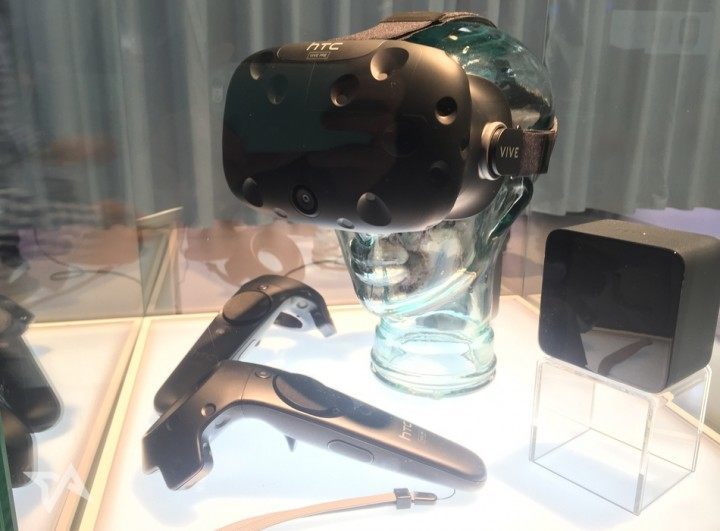
What a difference a year makes.
It was just over a year ago that my then colleague Paul wrote about how China’s top tech companies were hesitant about dipping their toes in the VR pool. But a lot has changed since then. China’s VR market is now expected to be worth US$8.5 billion by 2020, and everybody’s getting in on the action.
Whole lotta VR
All of the BAT companies were silent about VR last year, but now they’ve all got skin in the game. Baidu is working on a VR content platform with iQiyi. Alibaba is also working on VR content and (of course) commerce, and its new subsidiary Youku is working on content too. Tencent is working on content and a VR headset of its own.
Obviously, game companies are also getting in on the VR action. In addition to the aforementioned Tencent, there’s Netease working on VR content, Perfect World also building VR games, and many other major game developers following suit. Shanda is even working on a real-life VR theme park.
China’s powerful smartphone startups haven’t shied away from the VR market, either. Xiaomi confirmed this year it’s working on a VR project (probably a headset). LeEco already makes VR headsets for its mobile phones. Smartisan CEO Luo Yonghao just strongly hinted that Smartisan is about to reveal some VR gear of its own.
I think that it’s going to be a very bloody time in VR for a while
Even offline retailers are getting in on the action. Electronics chain Suning, for example, plans to set up 300 VR experience shops in China over the next three months using high-end hardware like the HTC Vive.
And of course there are a plethora of Chinese startups targeting the VR market in both hardware and software. Just recently, for example, we saw famed Chinese film director Zhang Yimou found a VR content startup, and we saw this cool VR motion-tracking treadmill get funded. And when it comes to Chinese startups in VR, that’s just the tip of the iceberg.
Overkill?
On the one hand, everyone’s enthusiasm for the VR market suggests it has a bright future. But on the other hand, this is the sort of pile-on we’ve seen in China’s tech industry before, where everybody pours money into a hot new sector (like group buying or P2P lending), with predictably rough results.
China’s VR sector could be headed for a similar fall, according to 500 Startups China partner Rui Ma. “I think that it’s going to be a very bloody [time] in VR for a while,” she told Tech in Asia. Part of the problem is that a lot about the market is still unclear. 500 Startups is looking at distribution platforms, she said, but it’s not yet clear whether existing platforms will be effective for distributing VR content or whether new, more specialized platforms will be what catches on. Another problem is that high-end VR hardware is both expensive and difficult to find. Right now, even if you’ve got the money and the PC for an Oculus Rift or an HTC Vive, it could be months before you actually receive your order. With so few of the devices out in the wild, it’s hard to be sure what’s working in the market and what isn’t.
But that’s not to say China’s VR market doesn’t look promising. Rui Ma said that 500 Startups has invested in a couple of VR content companies. She has been pushing them towards China, because the distribution that should be available through retail VR experiences like Suning’s shops dwarfs what’s available anywhere else, at least for the time being.
GGV Capital managing partner Jenny Lee also said that the virtual reality hype might be coming a little too soon. “For the market to become mainstream, more has to be done on the technology hardware side to make it untethered, resolve the nausea effect, and bring down the price point more,” she told Tech in Asia.
“I think AR [Augmented Reality] will be a larger platform than VR,” she said.
Recommended reads
 60/40 Podcast: Unpacking Chocolate Finance, Manus AI, and more
60/40 Podcast: Unpacking Chocolate Finance, Manus AI, and more IMDA launches $3.7m fund for SG media industry
IMDA launches $3.7m fund for SG media industry Nykaa’s financial health in 5 charts
Nykaa’s financial health in 5 charts Elevar Equity leads $6m seed round of India-based live commerce firm
Elevar Equity leads $6m seed round of India-based live commerce firm Cred founder backs India-based real estate platform’s $12m round
Cred founder backs India-based real estate platform’s $12m round India-based operating system maker nets $1m in seed money
India-based operating system maker nets $1m in seed money Venture Catalysts leads $1.5m round of India-based green marketplace
Venture Catalysts leads $1.5m round of India-based green marketplace Singapore-based co-living operator bags $1.3m in seed round
Singapore-based co-living operator bags $1.3m in seed round Microsoft set to slash 10,000 jobs (update)
Microsoft set to slash 10,000 jobs (update) Temasek-backed Haulio acquires Indonesian logistics startup
Temasek-backed Haulio acquires Indonesian logistics startup









